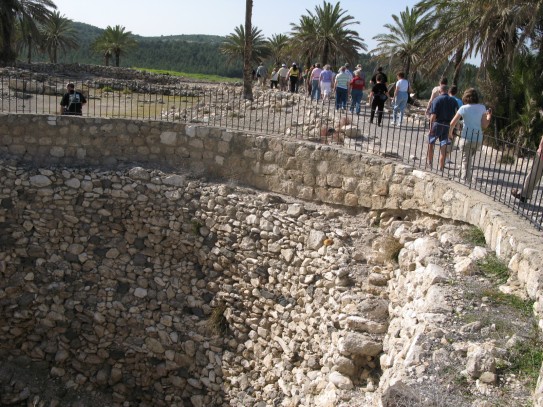
When we visited the Holy Land in 2008 (you can search my archives for March 2008 for a more in-depth look at that trip), we had a tour guide who talked to us a lot about Israel’s scant and precious water supply. The land there is arid, and if the rains don’t come at the expected times and drought sets in, things can get very difficult. Water is collected in cisterns and wells were guarded and fought over in biblical history.

When God called Abram to leave the fertile crescent of Mesopotamia, He was asking Abram to trust Him in more ways than one. At first glance, we see a 75-year-old man with a 65-year-old wife being told to leave all they knew in their well-watered, familiar land (where Abram probably held a decent inheritance) and move to a land they knew nothing about. (Scary thought!)
Then we see God telling Abram that He would become a father, and that his descendants would inherit this land God had planned to give him. So God was asking Abram to trust Him in a new location, where his barren wife would bear him a son. But there was more to that trust than we get from a cursory reading of the story.
When God told Abram he would inherit the land of Canaan, I have no doubt that Abram believed Him. But that didn’t mean Abram’s trust never wavered. Shortly after Abram was told his descendants would inherit Canaan, Abram moved south through the land, then further away from Canaan, toward the Negev (desert). When a famine struck Canaan, he kept going southward and slightly west toward Egypt. The Bible makes no mention of him seeking God’s guidance along the way.
In A Visual Guide to Bible Events the authors make note of the fact that Abram was following the security and wealth of the predictable in Egypt where the Nile River ensured fertile land and fresh water supply. Just like the land he had left in Mesopotamia in Ur, which lay near the Tigris and Euphrates Rivers. Both areas had rich lands, well-watered by the rivers whose sources came from miles away. Egypt’s inundation flowed like clock-work, and the ancients set their planting and harvesting seasons by the river’s predictable floods.
Canaan did not have such good fortune where their water was concerned (as our Israeli guide pointed out to our tour group on many an occasion). To live in the Promised Land (now known as Palestine and Israel) meant trust. For Abram, this meant setting aside his trust in what he knew, what was familiar, regular, predictable, and trust his God to provide – even so far as to provide his daily food and water.
The barrenness of the land of Canaan and the barrenness of Abram’s wife Sarai posed impossible odds that no man could overcome by mere human ingenuity. Abram could not give Sarai a child any more than he could make it rain. In both cases God simply asked him to trust Him. It was a lesson Abram continued to relearn the rest of his life.
Selah~